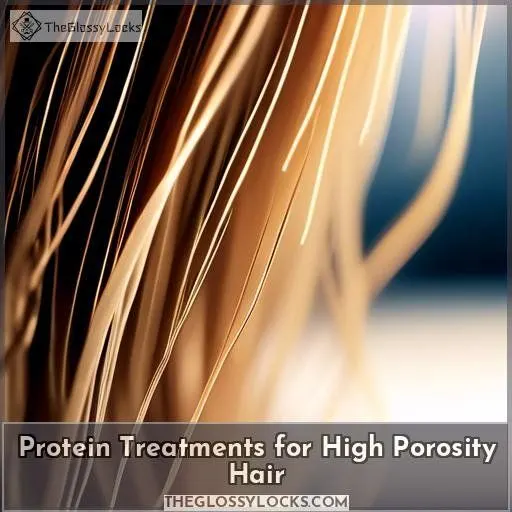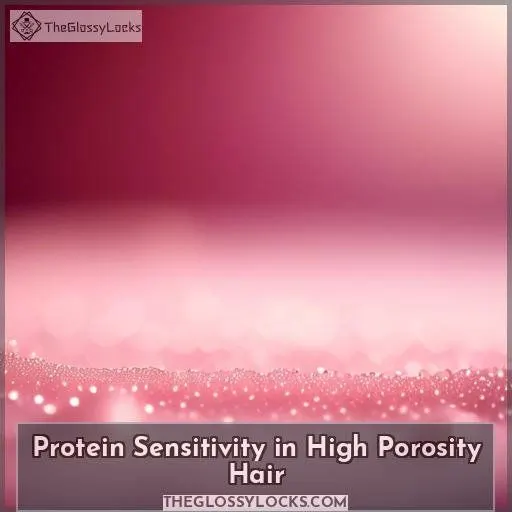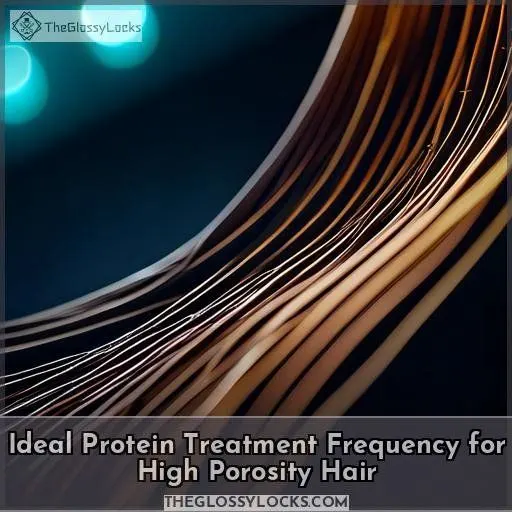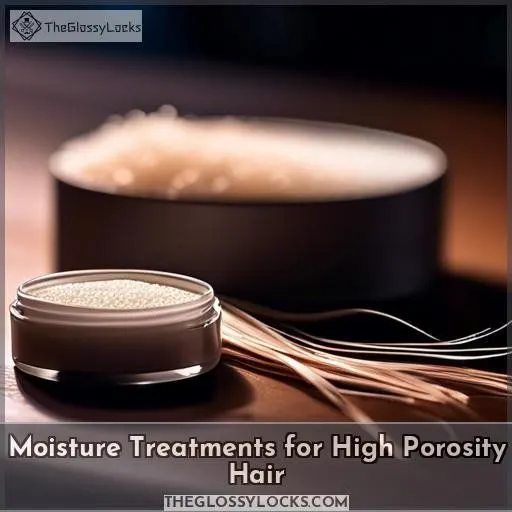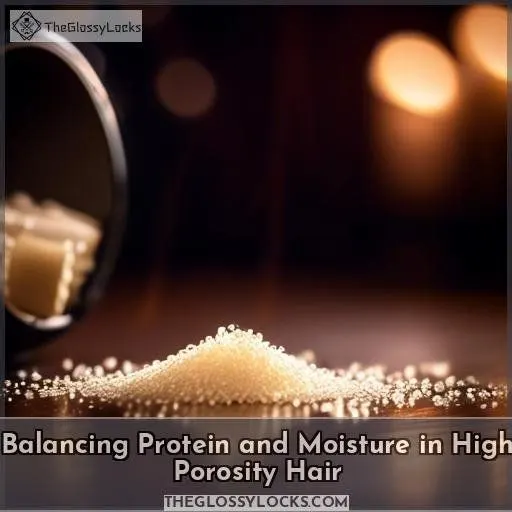This site is supported by our readers. We may earn a commission, at no cost to you, if you purchase through links.

Yes, highly porous hair can be protein sensitive.
The elevated cuticles and gaps in the strands allow excessive absorption of protein molecules.
This leads to rigidity, fragility, and increased breakage.
While protein treatments fortify the hair, utilizing them excessively on high porosity locks can be harmful.
You must judiciously balance protein and moisture for effective management of high porosity hair.
Porosity testing aids in ascertaining the appropriate frequency for protein treatments.
To master the balance, further investigation into customizing your regimen to your hair’s unique requirements is recommended.
Table Of Contents
- Key Takeaways
- Can High Porosity Hair Be Protein Sensitive?
- Protein Treatments for High Porosity Hair
- Protein Sensitivity in High Porosity Hair
- Ideal Protein Treatment Frequency for High Porosity Hair
- Moisture Treatments for High Porosity Hair
- Balancing Protein and Moisture in High Porosity Hair
- Choosing Protein-Rich Products for High Porosity Hair
- Frequently Asked Questions (FAQs)
- Conclusion
Key Takeaways
- High porosity hair is prone to protein sensitivity due to its raised cuticles and gaps in strands, which can lead to excessive absorption of protein molecules.
- Protein treatments can be beneficial for high porosity hair, but excessive use can cause stiffness, brittleness, and increased breakage.
- Regular porosity testing is essential for determining the appropriate frequency of protein treatments, ensuring that hair not only survives but thrives.
- Balancing protein and moisture is crucial for managing high porosity hair effectively, with protein-rich products used sparingly and moisture treatments focusing on hydration.
Can High Porosity Hair Be Protein Sensitive?
Yes, high porosity hair can be protein sensitive. High porosity hair has low protein content, which makes the hair strands less strong and more prone to dryness and brittleness. Overusing protein treatments can lead to dryness, brittleness, and even hair loss. It’s essential to find the right balance and avoid overusing protein treatments, as this can cause adverse effects.
Protein Treatments for High Porosity Hair
Venturing into the realm of highly porous hair, you’re embarking on a pursuit for radiant tresses.
Envision protein treatments as your secret weapon, bolstering each strand from within.
But it’s not merely about applying any product; it’s about deciphering the tempo of protein assimilation.
Through porosity testing, you’ll calibrate treatment frequency, guaranteeing that your hair not only persists but flourishes.
It’s a symphony of product synergy and hair fortification, where an excess of a beneficial substance is a genuine possibility.
Welcome to the equilibrium of protein and highly porous hair.
Protein Sensitivity in High Porosity Hair
High porosity hair, with its raised cuticles, is prone to moisture loss and protein sensitivity.
The structure of high porosity hair allows for quick absorption of protein, making it essential for strength and support.
However, excessive protein absorption can lead to stiffness, brittleness, and breakage.
To maintain balance, use protein treatments sparingly and focus on moisture treatments.
Choose protein-rich products based on your hair’s porosity needs.
Ideal Protein Treatment Frequency for High Porosity Hair
High porosity hair can be protein sensitive, but the ideal protein treatment frequency varies. Here are some guidelines to think about:
- Protein Overload: Avoid excessive protein treatments to prevent stiffness and brittleness.
- Protein Accumulation: Protein molecules can accumulate on the hair shaft without penetrating, leading to undesirable effects.
- Porosity Testing: Regularly test your hair’s porosity to determine the right frequency for protein treatments.
- Moisture Retention: Maintain proper moisture retention to prevent breakage.
- Breakage Prevention: Protein treatments can help strengthen and repair damaged hair, reducing breakage.
Protein treatments should be applied to damp hair, and frequency can range from once a month for low porosity hair to 1-2 times a month for high porosity hair. Remember, protein in hair products can provide strength, but overuse can lead to protein accumulation.
Moisture Treatments for High Porosity Hair
To keep high porosity hair hydrated, use moisturizing products like deep conditioners and hydration tips. Apply a triple-hydrating complex, rich in hyaluronic acid, to seal moisture in. Avoid over-moisturizing by following the Thirsty Curls range’s guidelines. Remember, hydration is key for healthy, strong curls.
Balancing Protein and Moisture in High Porosity Hair
Balancing protein and moisture in high porosity hair is essential for maintaining hair health and preventing damage. Here are three steps to help you achieve this equilibrium:
- Comprehend your hair’s requirements: High porosity hair requires a balance of protein and moisture to maintain strength and hydration. Excessive moisturizing can lead to frizz and limp curls, while inadequate moisturizing can result in dry, brittle hair.
- Modify treatment frequency: Adjust the frequency of protein and moisture treatments based on your hair’s needs. High porosity hair may benefit from more frequent protein treatments to fill gaps in cuticles, while moisture treatments should be used to retain hydration.
- Select the appropriate products: Opt for protein-rich products that are suitable for high porosity hair. Many oils and deep conditioners contain protein, so choose these products to enhance your hair’s strength and resilience.
Choosing Protein-Rich Products for High Porosity Hair
High porosity hair desperately requires protein-rich products. Here’s how to select them:
- Protein Absorption: Choose products with a molecular weight of 1000 daltons or less for best absorption.
- Cuticle Alignment: Products that align cuticles can better penetrate hair, ensuring protein reaches the shaft.
- Pore Filling: Fill pores with protein to strengthen hair and reduce damage.
- pH Balance: Maintain a pH of 4-7 for best protein bonding.
Frequently Asked Questions (FAQs)
What causes protein sensitivity in high porosity hair?
Like a sponge that’s lost its squeeze, high porosity hair struggles to hang onto protein treatments, leading to sensitivity. The raised cuticles allow too much absorption, overwhelming delicate strands.
How does protein sensitivity affect hair growth?
Protein sensitivity can stunt hair growth by causing brittleness and breakage. When strands snap off, your hair can’t retain length. Managing protein intake properly allows those healthy inches to flourish.
Can high porosity hair be damaged by too much protein?
Yes, high porosity hair can definitely be damaged by using too much protein. The raised cuticles allow excess protein to penetrate, leading to brittleness and breakage if you overdo it. Finding the right balance is key.
How often should high porosity hair be treated with protein?
You should treat high porosity hair with protein consistently, around 1-2 times per month. This’ll strengthen and reinforce those raised cuticles, filling in gaps for smoother strands.
What are the best protein-rich products for high porosity hair?
You’ll want to use moisturizing products packed with protein like hydrolyzed keratin, silk amino acids, and wheat protein. These’ll strengthen high porosity strands without weighing ’em down. Start light, assess, and adjust as needed.
Conclusion
Akin to a delicate ecosystem, high porosity hair requires careful balancing of protein and moisture. Your locks’ unique sensitivity demands creating a regimen that nourishes their porosity, strengthening strands without overwhelming them. Consistently monitoring moisture levels while thoughtfully introducing proteins will uncover the ideal pace for treatments, achieving the harmonious blend of strength and hydration your high porosity hair desires.

